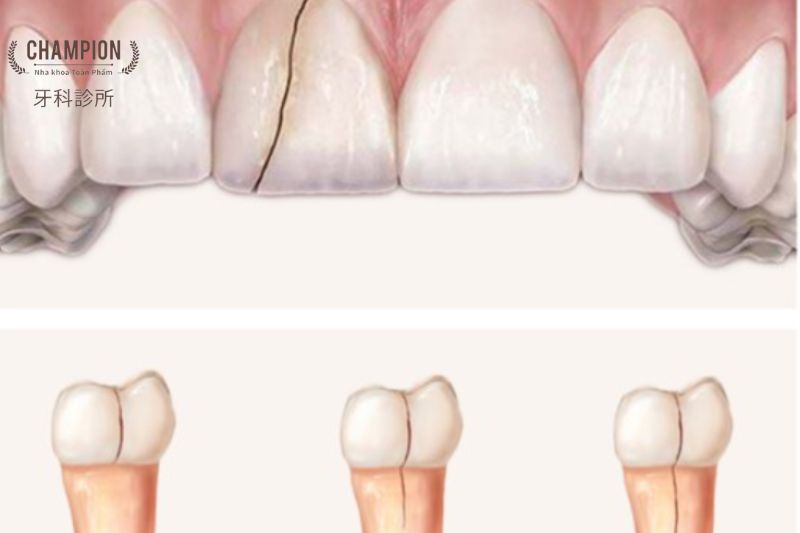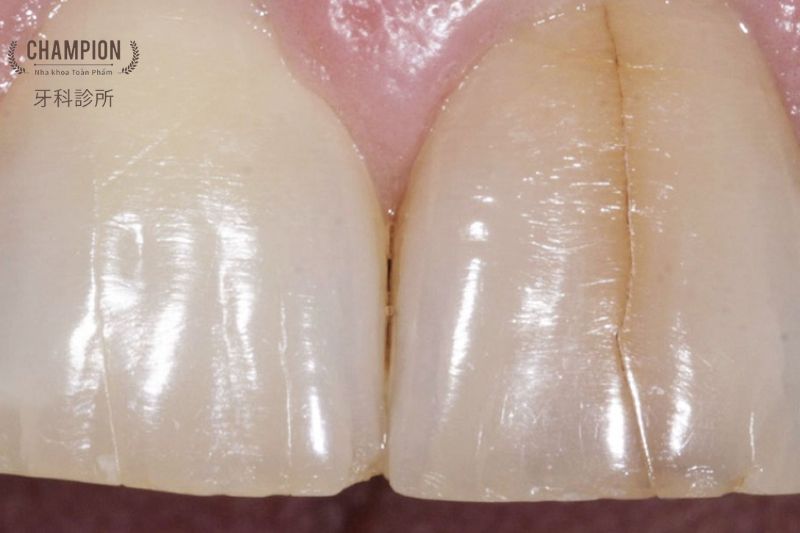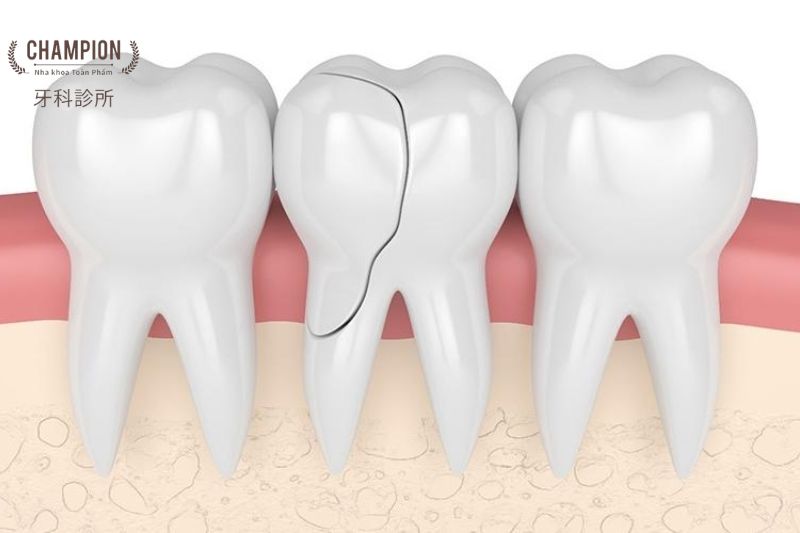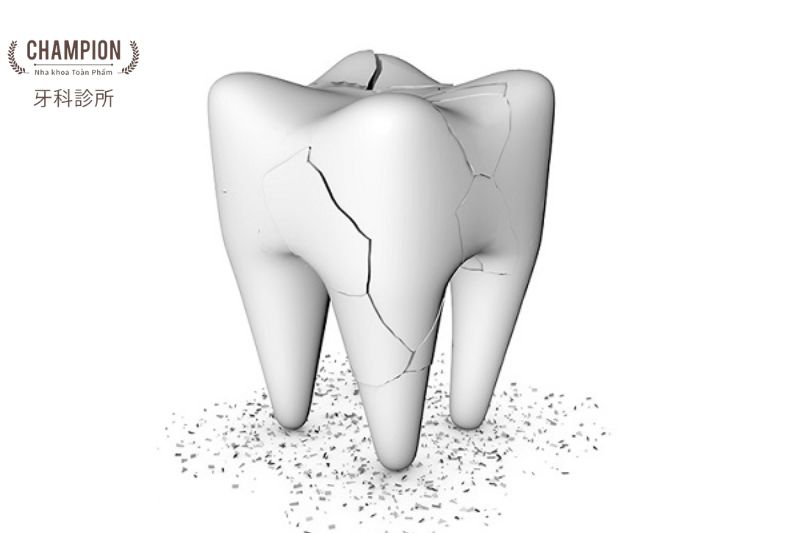In our daily lives, we often focus on caring for our outward appearance, but sometimes we overlook potential oral health issues. One such issue that deserves attention is a cracked tooth - a more common condition than you might think, and if left undetected and untreated, it can lead to serious consequences, damaging your confident smile.
What is a Cracked Tooth?
A cracked tooth occurs when a crack or fracture appears on the tooth surface, which can affect the internal structure or only cause cosmetic issues. These cracks can be present anywhere on the tooth, from the root to the crown. Sometimes, they may be difficult to see with the naked eye, but they can still cause discomfort and pain for the patient.
Types of Cracked Teeth
Depending on the severity, cracked teeth can be classified into different types:
- Cracked Tooth Enamel: This is the mildest type of crack, affecting only the outer enamel layer of the tooth. While it does not cause pain, it can affect the aesthetics of your smile, causing you to lose confidence.
- Cracked Dentin: This type of crack penetrates deeper into the dentin layer, potentially causing pain and sensitivity to temperature stimuli. This condition requires prompt treatment to prevent more serious complications and avoid impacting your quality of life.
- Cracked Tooth Root: This is the most severe type of crack, extending down to the tooth root, and may lead to tooth loss if not treated properly and promptly. The consequences of this type of crack not only affect your oral health but can also compromise your perfect smile.
Understanding the different types of cracked teeth will help you recognize the issue earlier and seek necessary medical care. Don't ignore any signs of a cracked tooth, as they could be a warning sign of a more serious oral health issue, threatening your confident smile.
At Champion Dental Clinic, we are committed to providing you with detailed information about cracked teeth, as well as the most effective treatment methods. Contact us for professional consultation and oral health care, helping you restore your radiant and confident smile.

What Causes Cracked Teeth?
Cracked teeth are a common issue that many people experience. Various factors, ranging from mechanical trauma to unhealthy habits, can contribute to this condition.
Mechanical Trauma
Mechanical trauma is one of the leading causes of cracked teeth. Such trauma can occur due to accidents, impacts, or participation in high-contact sports. The force of these impacts can exceed the strength limits of the tooth, leading to cracks or fractures in the enamel and dentin.
Chewing on Hard Objects
Another unhealthy habit that can cause cracked teeth is chewing on hard objects like nuts, seeds, or ice cubes. The excessive pressure from chewing on hard objects can crack or break the enamel and dentin. This can happen immediately or gradually over time.
Teeth Grinding (Bruxism)
Teeth grinding, especially during sleep, is also a common cause of cracked teeth. The pressure created by grinding can lead to cracks or wear on the enamel and dentin. If left untreated, teeth grinding can cause more severe dental problems.
Other Causes
In addition, there are several other causes that can contribute to cracked teeth, including:
- Untreated Cavities: Cavities can weaken the tooth structure and lead to cracks or fractures if not treated promptly.
- Improper Tooth Extraction: If a tooth extraction is not performed correctly, it can exert excessive pressure on the tooth and cause cracks or fractures.
- Excessive Tooth Use: Habits like nail-biting, pen-chewing, or using teeth to cut or open objects can place excessive stress on the teeth, leading to cracks or fractures.
- Temporomandibular Joint (TMJ) Disorders: Disorders of the temporomandibular joint can cause uneven pressure on the teeth, resulting in cracks or fractures.
To prevent cracked teeth, preventive measures such as avoiding chewing on hard objects, using night guards for teeth grinding, treating cavities early, and avoiding excessive tooth use habits are recommended. If you experience a cracked tooth, it is essential to seek prompt dental treatment to avoid further complications.

Warning Signs of a Cracked Tooth
A cracked tooth is a fairly common dental condition, but that doesn't make it any less painful and uncomfortable for the patient. If left undetected and untreated, a cracked tooth can lead to more serious complications such as infection or tooth loss. Therefore, recognizing the warning signs is extremely important.
Persistent Pain
The most common symptom of a cracked tooth is persistent, lingering pain. The pain can onset suddenly or be a dull, persistent ache, depending on the severity of the crack. The pain often worsens when exposed to stimuli such as hot, cold foods or carbonated drinks.
Temperature Sensitivity
In addition to pain, those with cracked teeth often experience sensitivity and a stinging sensation when exposed to hot or cold foods and drinks. This is because the crack exposes the dentin, making the tooth more vulnerable to temperature stimuli.
Difficulty Chewing
Depending on the location and severity of the cracked tooth, patients may experience difficulty chewing. Chewing or biting motions can cause sharp pains or stinging sensations in the affected tooth area.
Visible Abnormalities on the Tooth
In some cases, a cracked tooth may be visible to the naked eye. Patients may notice cracks or tiny fracture lines on the tooth surface, or even discoloration of the tooth.
Recognizing these warning signs early is crucial for seeking prompt dental treatment and preventing the crack from worsening and causing further damage. Don't ignore any lingering tooth pain or sensitivity, as it could be an indication of an underlying cracked tooth issue.

Effective Diagnostic Methods for Cracked Teeth
Accurately diagnosing a cracked tooth is the first crucial step in determining the appropriate treatment method. With the advancement of modern medical technology and techniques, dental professionals today have many options to comprehensively and accurately assess cracked tooth damage.
Clinical Examination
A clinical examination is a basic but extremely important method in diagnosing cracked teeth. The dentist will use specialized tools such as a dental light, mouth mirror, and dental explorer to thoroughly inspect each of the patient's teeth. This process helps detect any abnormalities on the tooth surface and provides an initial assessment of the crack's severity.
X-rays
In addition to the clinical exam, x-rays are an indispensable method for diagnosing cracked teeth. With the development of digital imaging technology, dentists can obtain high-quality x-ray images, allowing them to accurately assess the degree and location of the crack. Furthermore, this method also helps determine whether the crack affects the tooth pulp, which is crucial in selecting the appropriate treatment method.
Temperature and Vibration Testing
In some cases, the dentist may use additional diagnostic methods such as temperature testing and vibration checks. Temperature testing involves using hot or cold foods or drinks to assess the sensitivity level of the cracked tooth. Vibration checks are performed by gently tapping the tooth with a dental instrument and observing the patient's reaction. These methods help the dentist evaluate the severity of the damage and make a more accurate diagnosis.
Dental Endoscopy
In complex cases, dentists may use advanced dental endoscopy technology to observe the tooth's interior in detail. This method utilizes a small endoscope that can transmit images and light into the tooth, helping the dentist detect cracks or damage that may be difficult to see with the naked eye or x-rays.
With the assistance of these modern diagnostic methods, dental professionals can comprehensively assess the condition of a cracked tooth and recommend the appropriate treatment, effectively and sustainably protecting the patient's oral health.

>>> See more: Does having closely spaced teeth affect health? Preventative measures
Effective Cracked Tooth Treatment Methods at Champion Dental
A cracked tooth can sometimes cause discomfort and impact quality of life. At Champion Dental, we proudly offer professional, safe, and highly effective solutions for treating cracked teeth.
Tooth Bonding - A Simple Solution for Minor Cracks
For minor tooth cracks, bonding is an ideal treatment method. This process involves using synthetic material to fill in the crack. The dentist will then shape and polish the tooth surface to restore its appearance and aesthetics. With professional bonding techniques, minor cracks can be treated quickly and effectively.
Dental Crowns - A Comprehensive Solution for Severe Cracks
In cases of more severe tooth cracks, getting a dental crown is the ideal method. This process involves two main steps.
First, the dentist will smooth out the damaged portion of the tooth. Next, a ceramic or synthetic outer shell will be attached to the tooth.
This crown not only protects the tooth from further damage but also restores the tooth's original shape and function.
Tooth Extraction - The Last Resort for Extremely Severe Cracks
In rare cases where the crack is extremely severe, tooth extraction may be the only solution. However, this method is only applied after other treatment options have proven ineffective.
Our dentists will provide thorough consultation and discussion to determine the most suitable decision for each specific case.
At Champion Dental, we pride ourselves on using the latest technologies, equipment, and techniques. Our experienced team of dentists will select the optimal treatment method for your cracked tooth condition.
We always prioritize patient safety and health. Additionally, we emphasize creating a friendly and comfortable environment to ensure the best treatment experience for you.
Effective Cracked Tooth Prevention Methods
In addition to treatment, prevention is also an important factor in reducing the risk of future cracked teeth. At Champion Dental, we encourage the following preventive measures:
Avoid Biting Hard Objects
The habit of biting hard objects such as nuts, seeds, or ice cubes can exert significant pressure on your teeth. This leads to a high risk of cracked or broken teeth.
Therefore, avoid biting hard objects to protect your teeth. If you struggle to control this habit, consult your dentist for support.
Use Dental Night Guards
If you have a teeth-grinding habit while sleeping, using a dental night guard is an effective preventive measure. The night guard will reduce pressure on your teeth, thereby lowering the risk of cracks.
Our dentists can provide advice and custom-design night guards for your specific needs.
Treat Teeth Grinding
In addition to using night guards, treating teeth grinding is also crucial. Behavioral therapies or stress-reducing medications can help control teeth grinding.
By treating teeth grinding, the pressure on your teeth will be reduced, lowering the future risk of cracked teeth.
Regular Dental Check-ups
Finally, we encourage you to schedule regular dental check-ups. Regular check-ups allow for early detection of oral health issues, including cracked teeth.
When detected early, these issues can be treated promptly, preventing further complications and promoting long-term oral health.
At Champion Dental, we are committed to providing professional, safe, and highly effective oral care services. Contact us for advice and to choose the most suitable preventive and treatment methods for cracked teeth.
Vietnamese & English: (028) 5411-2295
中文: (028) 5411-2297 172 Nguyen Luong Bang, Tan Phu Ward, District 7, Ho Chi Minh City.
Fanpage: Champion Dental Clinic 牙科診所
Zalo: Champion Dental Clinic
Youtube: Champion Dental Clinic 牙科診所
 Champion Dental Clinic
Champion Dental Clinic



